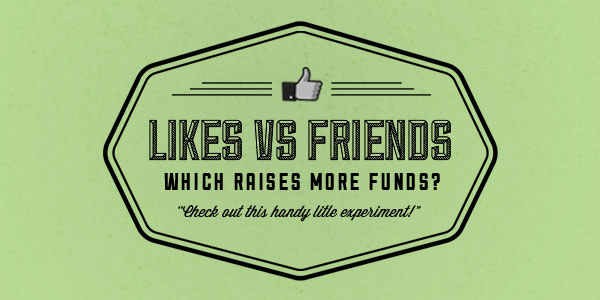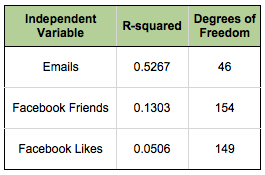
Does Attempting to Go Viral Make Sense When Crowdfunding Your Music?
In talking to musicians about their crowdfunding projects, a very common assumption is that you need to reach as many new people as possible.
But in reviewing hundreds of projects, it appears that the most successful projects usually also do the best job of contacting and fundraising within their current Circle of Influence: the people who they already know including family, friends, fans and such.
So, what’s the best strategy here, to focus on creating new relationships or on existing relationships?
Another way to phrase this question is who will pledge more to your campaign? Strangers you just met and don’t know very well? Or people who already know you, trust you and value what you are doing?
Well, obviously a person who you are very close to such as a family member or best friend is a lot more likely to back your project than is some stranger from cyberspace. And this is true even if both of them like your music the same amount!
The difference between the two types of people is that you have a personal connection with one but not the other.
So, with all of this in mind, I thought I’d turn to the numbers to see what they would suggest.
The Experiment: What’s a Better Predictor of Backers, Number of Facebook Friends or Number of Facebook Likes?
Just to be clear, we are not trying to measure how many of your Friends or Likes will become backers. That is much more complex.
We are simply looking to see how well either of these numbers predicts the final number of backers.
For good measure, I will also take a look at the size of the projects’ email list.
What I want to know is whether the numbers which demonstrate a more personal connection to the project do a better job of predicting how many backers the project will have.
In other words, do you get a better sense of how well a project will do as you look at closer relationships to the project.
If this is the case, it should give you a pretty solid idea of how other projects are working and, assuming that you don’t have some crazy situation, it will give you a good idea of where to focus your attention when you launch.
And The Winner Is… number of Emails!
The number of Facebook Friends correlates with Project Backers 2.5 times better than Facebook Likes!
BUT…
I can also tell you that the number of project backers relates to the size of a project’s email list 4 times better than to the number of Facebook Friends. This would be 10 times better than number of Facebook likes.
Take a look at the table below:
Each row of the table was a separate regression modeling backers as a function of the specified variable. If that didn’t make sense, don’t worry about it and just keep going.
The important thing to note is the column called “R-squared” which is basically how well the variable predicts the number of backers. The lower this number, the less the variable explains the number of backers. The higher this number, the better it explains the number of backers.
If you care about the column called “Degrees of Freedom”, read the next nerd-oriented box. If not, skip ahead.
The data set included 204 projects. Each project had data for at least one of the three proxies (Likes, Friends, or email). Each regression used all available data points for the given variable so the sample sizes did differ. The data set was collected by hand so it isn’t unimpeachable. However, there are enough observations to have some confidence in the results which are consistent with expectation.[/box]
Stronger Personal Connection = More Likely to Pledge
The implications are pretty major here.
You can count on pledges from those you are closest to much, much more than from new people you encounter mid-campaign.
And honestly, we don’t need to design some highfalutin, fancy-ass statistical test to know that. It’s simply human nature.
The more familiar and personal you are with a person (or set of people), the more likely those people are to pledge.
That’s why most projects gain as many or more backers from their set of personal connections like friends, family and turbo-fans as they do from larger groups of people such as all of their Facebook Likes.
Bottom line, the stronger your connections, the more you should concentrate on that group of people.
Project funding depends on the volume of your trusted, personal relationships much more than it does on the number of loose connections you have floating around in cyberspace. This is especially true for the 75% of crowdfunding projects that will raise less than $10,000.
Existing Relationships Matter Most
The reality of crowdfunding for most independent artists is that the audience most likely to contribute to and fund your project is the audience you already have: friends, family and current fans.
This audience will back you because:
- They feel obligated to back you.
- They want to support you as an individual and they want to see you succeed at your passion.
- The project personally connects with them or they really want your product.
These are the top three reasons a person will back you. Period. Counting on any other reason as somebody’s motivation to back you has a low percentage probability of working.
Existing relationships matter.
These are the people who will fund your project.
The takeaway: your best bet for crowdfunding your project is to concentrate on your existing relationships. Contact them in the most intimate, personal way possible and you will be on your way to a successful crowdfund!


Thank you so much for an extremely helpful article. There is so much advice out there about utilizing social media, how to get publicity, analytics on driving traffic, and it’s overwhelming. My gut sense was that I should concentrate on my own email list, with a little bit of work on Facebook (where I contribute content to a number of content pages), and not worry about all the other things I don’t have time to pursue. You have saved me an enormous amount of stress and panic!
Lauren, thanks for the awesome comment! Your thoughts remind me of 2 important things…
1) Definitely concentrate on people who are already in your Circle of Influence (fans, friends, family) while crowdfunding… Gaining fans during this stage of your career should be a very secondary goal and should not come before contacting your Circle of Influence.
2) When you aren’t crowdfunding is the time to work on growing your Circle of Influence! But having an intentional, focussed strategy will pay off much more in the long run ~ so, like you said, focus on your email list with a little bit of Facebook (or whatever platform one would choose) and then don’t worry about ALL OF THE OTHER STUFF.
If you are a normal person working more or less independently, trying to cover every social media platform will just dilute your effort to the point of ineffectiveness. Thanks for pointing that out!
Btw, are you going to launch a crowdfunding project?